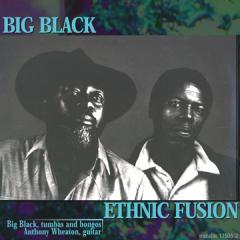BIG BLACK / Ethnic Fusion
Big Black (tumbas and bongos); Anthony Wheaton (guitar)
Big Black had more than his usual accumulation of drums set on one side of the room. Tumbas, congas, bongos, miscellaneous percussion devices. Black, as usual, was wearing a coarse-thread African shirt that hung over his pants. His hands aren’t just large, they’re astonishingly muscular. They seem to have joints that the rest of us don’t possess, muscles that are unseen by non-fingerdrummers. Wheaton played his classical guitar constantly. Phrases came, and went; Black would ripple across five drum heads–Wheaton cascaded down the guitar strings. Call-and response, I thought to myself. What I hear are marvelous shadings on the drums, brilliant (and considerably more introspective) playing by Wheaton on the guitar. And I hear a wild assortment of rhythms—the bata, wawaco, samba, ska and calypso-reggae beat (among others I can’t identify). Black has a solo track, Wheaton often erupts, and at other times seems just to bubble. (From the original liner notes from the 1982 lp – Philip Elwood)
TRACK LIST
China Lake (7:00)
Pavan (4:28)
Jigs (5:19)
Afro-Cuban Lullaby (7:27)
Trinidad (10:32)
REVIEWS
Richard di Santo, The Incursion Music Review
Ethnic Fusion is a reissue of an LP released on 1750 Arch Records in 1982. Percussionist Big Black, performing on tumbas and bongos, is accompanied by Anthony Wheaton on guitar. Raised in Georgia, Big Black is credited as being one of the first musicians to translate bebop rhythms to hand drums. Throughout the 50's he performed in salsa and calypso bands, and in the 60's he moved to New York to explore his burgeoning interest in bebop and develop a unique teaching method for hand drums known as "Heart Beat".
Ethnic Fusion features five pieces of varying length. Anthony Wheaton accompanies Big Black's hand percussion with admirable dexterity and charisma; his performance is strongly influenced by classical music, as phrases from classical repertoires appear and disappear at regular intervals (this is especially evident in the lighthearted and classically informed track "Jigs"). Big Black's percussion - the force of his rhythms, his energy and sensitivity to Wheaton's playing - is really something to marvel at. The simple set up of drums and guitar ensures that the focus is always on the rhythms and the playful melodies on guitar that flirt with the more dominant percussion. African-classical-carribbean-american sound-fusion? sounds great to me. An original, spirited and engaging work, reissued and admirably rescued from obscurity by Mutable Music.
François Couture, All-Music Guide
When an album is deemed "unclassifiable," it usually is either because one feels it belongs to a style yet to be defined or because one doesn't know what to do with it. There is a little of both in the case of Ethnic Fusion. For this late 1981/early 1982 studio session, percussionist Big Black teamed up with a young guitarist named Anthony Wheaton. He plays acoustic guitar with a definite classical background. Black handles the tumbas and bongos with great dexterity, playing with fire and conviction. The unamplified duo performs original compositions that stand somewhere between classical Spanish guitar pieces and Afro-Cuban jazz - in "Trinidad" the 12-string guitar part even conjures Anthony Phillip's album Twelve. The meeting between the delicate guitar lines and Black's rock-hard hands is unexpected and highly unusual, but it works. It may take you a couple of listens at first to get used to the very low recording level and the initially frightening inequality between the two instruments. Even though the percussionist dominates, the real leader is Wheaton. His inflections in "China Lake" trigger Black's choice of rhythms. The "Pavan," very 16th-century, constitutes an extreme example of these two worlds colliding. After the guitar has stated the theme, the tumbas enter thunderously, retreating to let the theme rise again, almost inaudible. And what about the "Jigs," so French in spirit, accompanied by African instruments. This one-of-a-kind fusion was first released in 1982 on 1750 Arch and reissued on CD in 2001 on Mutable Music.

